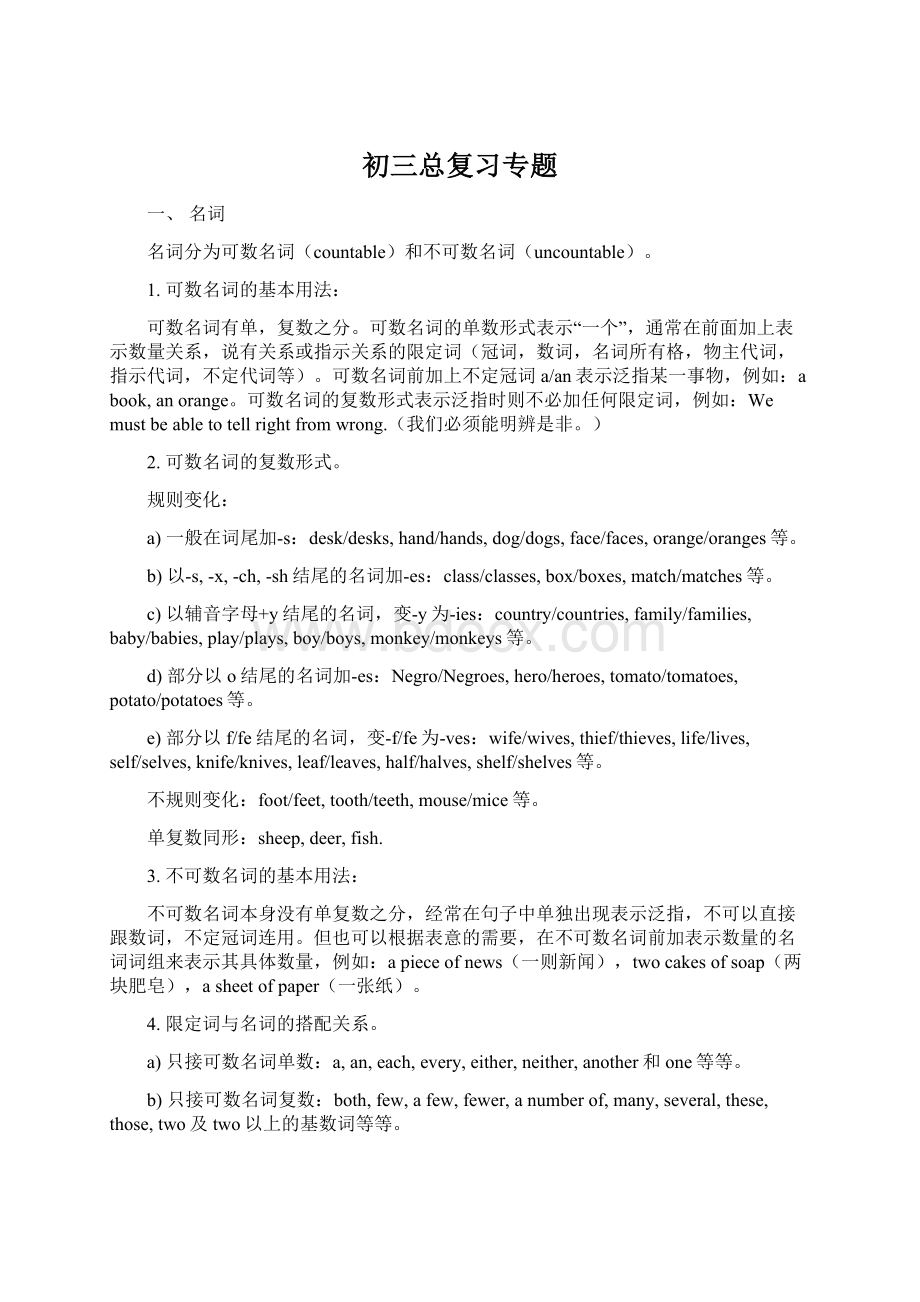初三总复习专题.docx
《初三总复习专题.docx》由会员分享,可在线阅读,更多相关《初三总复习专题.docx(45页珍藏版)》请在冰豆网上搜索。

初三总复习专题
一、名词
名词分为可数名词(countable)和不可数名词(uncountable)。
1.可数名词的基本用法:
可数名词有单,复数之分。
可数名词的单数形式表示“一个”,通常在前面加上表示数量关系,说有关系或指示关系的限定词(冠词,数词,名词所有格,物主代词,指示代词,不定代词等)。
可数名词前加上不定冠词a/an表示泛指某一事物,例如:
abook,anorange。
可数名词的复数形式表示泛指时则不必加任何限定词,例如:
Wemustbeabletotellrightfromwrong.(我们必须能明辨是非。
)
2.可数名词的复数形式。
规则变化:
a)一般在词尾加-s:
desk/desks,hand/hands,dog/dogs,face/faces,orange/oranges等。
b)以-s,-x,-ch,-sh结尾的名词加-es:
class/classes,box/boxes,match/matches等。
c)以辅音字母+y结尾的名词,变-y为-ies:
country/countries,family/families,baby/babies,play/plays,boy/boys,monkey/monkeys等。
d)部分以o结尾的名词加-es:
Negro/Negroes,hero/heroes,tomato/tomatoes,potato/potatoes等。
e)部分以f/fe结尾的名词,变-f/fe为-ves:
wife/wives,thief/thieves,life/lives,self/selves,knife/knives,leaf/leaves,half/halves,shelf/shelves等。
不规则变化:
foot/feet,tooth/teeth,mouse/mice等。
单复数同形:
sheep,deer,fish.
3.不可数名词的基本用法:
不可数名词本身没有单复数之分,经常在句子中单独出现表示泛指,不可以直接跟数词,不定冠词连用。
但也可以根据表意的需要,在不可数名词前加表示数量的名词词组来表示其具体数量,例如:
apieceofnews(一则新闻),twocakesofsoap(两块肥皂),asheetofpaper(一张纸)。
4.限定词与名词的搭配关系。
a)只接可数名词单数:
a,an,each,every,either,neither,another和one等等。
b)只接可数名词复数:
both,few,afew,fewer,anumberof,many,several,these,those,two及two以上的基数词等等。
c)只接不可数名词:
little,alittle,less,much,abitof呵呵agreatamount/dealof等等。
d)接可数名词复数或不可数名词:
alotof,lotsof,plentyof,more,most,all等等。
e)接可数名词和不可数名词:
any,some,no,the,物主代词,名词所属格等等。
5.名词构成法。
a)合成法:
有两个或两个以上的词合成一个新词,例如:
toothpaste,blackboard,handwriting,afternoon.
b)派生法:
在一个单词前面或后面加上一个词缀构成新词,叫做派生法。
加在单词前面的词缀叫前缀,加在单词后面的词缀叫后缀,这个单词叫做词根。
前缀一般改变词义,后缀一般改变词性。
表示否定的前缀:
un-,dis-,im-,in-,ir-,mis-,non-…
unhappy,unfair,disable,disagree,impolite,impossible,incorrect,incomplete,irregular,misunderstand,mistake,nonsmoker,nonstop.
常见构成名词的后缀:
-er/-or从事某事的人:
visitor,professor,runner,cleaner;-ess雌性:
waitress,actress
-ist专业人:
scientist,terrorist,artist,pianist,dentist;
-ician精通……的人:
musician
-ese某地人:
Chinese,Japanese
-ment性质,状态:
development,encouragement
-tion动作,过程:
invitation,prediction,invention,education,operation,predictionattraction
-th:
death,growth;-y/ty:
difficulty,safety
-ness:
busy—business,goodness,illness,happiness,kindness,sadness
-hood:
neighborhood,childhood,boyhood,girlhood.
I.单项选择。
1.—Tom,whatwouldyouliketoeat?
—I’dliketoeatalittle____.
A.hamburgerB.broccoliC.coffeeD.apple
2.—Doyouknow____aregoingtowatchtheAsianGamestomorrow?
—Yes.I’llgowiththem.
A.MrGreenB.theGreen’sC.theGreensD.theGreen
3.—Wow,howbigtheroomis!
Whoseroomisit?
—Ithinkit’s____room.
A.Jim’sandJack’sB.Jim’sandJackC.JimandJackD.JimandJack’s
4.Asforstudents,wecangetlotsof____fromourbooks.
A.populationB.furnitureC.knowledgeD.suggestion
5.—Oh,whatabeautifulschoolyard!
—Yeah!
Werebuiltourschoollastyear,sowehavea____runningtracknow.
A.400-meterB.400-metersC.400meter’sD.400meters
6.—Wherearethe____?
—Theyareplayingvolleyballontheplayground.
A.girlsstudentsB.girlstudentsC.girlstudentD.girlsstudent
7.TheshoesIboughtlastmontharesosmallnow.Iwanttohaveanew____.
A.oneB.shirtC.pairD.belt
8.—Wouldyoubesokindastogivemea____?
I’mtootiredtowalkanyfurther.
—Iamsorry,butthecaristoocrowded.
A.placeB.roomC.seatD.drive
9.Britishpeoplelikeeating____,andtheyareusuallycookedbydifferentways.
A.potatoesB.fishC.chickenD.beef
10.—What’sonthedesk?
—Afew____,butlittle____.
A.water;orangeB.orange;waterC.orange;waterD.water;oranges
II.根据括号中所给汉语写出相应的单词。
1.Iwonderifthereareany____(建议)abouthowtodealwiththeproblem.
2.Ibelieveyouhavemadeagood____(决定).
3.Ladiesand____(先生),let’shelpthepeopleinYushuCountytogether!
4.Many____(旅行者,观光者)fromallovertheworldvisitedShanghaiduringExpo2010.
5.Theyoungmenscreamedwith____(兴奋,激动)whentheysawtheirfavoritestarcomingin.
6.The____(航班)arrivedinHongKongontimethoughtheweatherwasbad.
7.Theyeatalotof____(鱼)everyyear.
8.Therescuedminersinallreceivedgood____(治疗)inlocalhospitals.
9.Ourheadmastermadea____(发言)inourschool’sEnglishCulturalFestival.
10.The____(架子)inthelibraryarefullofdifferentkindsofbooks.
I.用括号中所给词的恰当形式完成下列句子。
1.Anewteaching____isbeingbuiltinmyschool.(build)
2.Iknowonlyoneofthe____.Howaboutyou?
(writer)
3.Thereisafamoussaying,“____isthebestpolicy.”(honest)
4.TheEnglishnewspaperChina____istoodifficultforsecondaryschoolstudentstoread.TheycanreadShanghaiStudent’sPostinstead.(day)
5.Iwishyou____andhealthforever.(happy)
6.mycousinBenhasreadmanydetective____thisterm.(story)
7.MrSmithtoldusthathisearly____hadbeenveryhappy.(child)
8.themanmadesome____onhowtolearnEnglishwell.(advise)
9.It’sfive____walkfrommyhometomyschool.(minute)
10.MarieCuriereceivedtheNobelPrize____(two)duringherlifetime.
二、冠词
冠词是英语中最小的词类,仅有三个词a,an,the。
冠词在考试中一般只设置一个小题,常见的考点如下:
1.不定冠词a与an的用法;2.定冠词the的用法;3.定冠词,不定冠词和零冠词在固定短语中的应用。
冠词用于类指:
1)不定冠词a/an的用法:
表示“一”,相当于“one”;表示某一;表示某类,泛指。
a university a European boy a useful book a uniform
an unlucky cat an hour an honest girl
2)定冠词the的用法:
表示特指;和可数名词单数连用表一类人或物;和形容词连用表一类人或物;和姓氏加s表示一家人;表示世界上独一无二的东西,等等。
Thehorseisausefulanimal.
=Ahorseisausefulanimal.
=Horsesareusefulanimal.
冠词用于短语中:
3)一般情况下,在序数词,最高级,乐器,江河,山脉,群岛,报刊杂志等名词前要用冠词the。
在表示季节,月份,节假日,日期,星期,称呼,官衔职位,三餐,球类运动等名词前不用定冠词。
4)在某些名词前有没有冠词,意义不同。
例如:
Shelistenscarefullyinclass.她上课时仔细听讲。
Sheisthebeststudentintheclass.她是班上最好的学生。
Charliehasgonetoschool.查理上学去了。
Charlie’sfatherwillgototheschooltoseetheheadmaster.查理的父亲要到学校去见校长。
Theyareattable.他们在用餐。
Heissittingatthetable,doinghishomework.他坐在桌旁做作业。
冠词(含零冠词)在某些固定短语中的运用:
atnoon,atnight,atdawn,atmidnight;intown,infrontof;playvolleyball/basketball/football;catchacold,haveacold;inthemorning/afternoon/evening;inthedistance,atadistance;onthewhole,asawhole;playthepiano,etc.
冠词在具体运用中很复杂,做题时还应注意根据上下文的语境准确地把握句中名词的可数与不可数,泛指与特指等关系。
【经典试题】
1.Avatarissuch____wonderfulsciencefictionmoviethatIwanttoseeit____secondtime.
A.a;aB.a;theC./;theD./;a
2.-Shallwepay____visittoExpo2010Shanghai?
-No,I’dratherstayathomeandplay____football.
A.a;theB.the;aC./;theD.a;/
3.IntheUnitedStates,Father’sDayfallson____thirdSundayin____June.
A.the;/B.the;aC./;theD.a;/
4.-Mike,couldyoucomeandgiveme____hand?
-OK,Mum.I’mcomingnow.
A.aB.anC.theD./
5.____Brownswerehavingdinnerwhenthetelephonerang.
A.AB.AnC.TheD./
6.Shoppingonlineisreally____usefulandconvenientwayforustobuy.
A.aB.anC.theD./
7.Studentsusuallyhave____one-daytripinthesuburbsinspring.
A.aB.anC.theD./
8.Ireallyenjoyplaying____guitar,whileMaryisinterestedinlisteningtomusic.
A./;theB.the;/C./;/D.the;the
9.-Howabout____charityshow?
-Ishouldsayitwas____success.
A.a;/B.a;aC.the;/D.the;a
10.Attention,please.____“h”intheword“honest”issilent.Youcan’tloseit.
A.AB.AnC.TheD./
【考点精练】
1.____apple____daykeeps____doctorsaway.
A.A;a;aB.An;a;theC.The;a;aD.The;a;/
2.-Oh,doctor,something’swrongwithmyteeth!
-Don’tworry!
Youshouldtake____medicinethreetimes____day.
A.a;aB./;aC.the;aD.the;/
3.Ibought____newskirtyesterday.____skirtischeapandbeautiful.
A.a;TheB.a;/C.the;AD./;The
4.-I’msotired,Mom!
-Let’sgooutfor____walk.
A.theB./C.aD.an
5.____GreatWallis___longestwallintheworld.
A.The;aB.A;/C.A;theD.The;the
6.Thisis____usefulbook.Ihavereaditfor____hour.
A.a;aB.the;theC.a;anD.the;a
7.____l(L)ifeisshort,but____artislong.
A.A;anB.The;anC.The;theD./;/
8.Heprefersmilkandbreadfor____breakfast.
A.aB./C.theD.an
9.Bobdoesn’tplay____chess,butheplays____guitarverywell.
A.a;theB.a;/C.the;theD./;the
10.It’swellknownthat____earthgoesaround____sun.
A./;/B.an;aC.the;theD.an;the
11.Inmyclassroom,there’s____blackboardandtherearefiftydesks.
A.theB.aC.anD./
12.-Howdoyougoto____work?
-Iusuallytake___bus.
A.the;aB./;aC.a;aD.the;/
13.There’s___800-metre-longroadbehind____hospital.
A.an;anB.a;aC.an;theD.a;the
14.On____sunnyafternoon,myparentsandIhadagoodtimeonthebeach.
A.theB.anC.aD./
15.Yesterday,Ihad____bigdinnerwithmyparentsinthatrestaurant.
A.aB.anC.theD./
16.-Ijusthave____cupofmilkfor____breakfast.-That’snotenough.
A.a;aB.the;theC.a;/D.a;the
17.MyEnglishteacherhas____8-year-oldgirlcalledMary.
A.anB.aC.theD./
18.-Jim,shallwegoandplay____footballinBaishiPark?
-Idon’tthinkthat’sagoodidea.
A.aB.theC./D.an
19.-There’s____bookontheshelf.Wouldyoupleaseget____bookforme?
-Withpleasure.
A.a;theB.the;aC.a;aD.the;the
20.Itwon’tbelong.I’llbebackinhalf____hour.
A.theB.aC.anD./
三、代词
代词是用来代替名词的词。
它是英语语法结构中的一个重要项目,也是中考测试的重点内容之一。
纵观各类试题,出现频率最高的是不定代词,其实是it用法,疑问代词,反身代词以及人称代词等。
其常见考点如下:
1)人称代词的主,宾格及其语法功能;
2)形容词性物主代词和名词性物主代词的用法和区分;
3)反身代词的用法及其语法功能;
4)指示代词this,that,these,those等词在句中作主语,宾语,定语的用法;
5)不定代词的用法;
6)疑问代词,连接代词,关系代词的用法;
7)it,one(s),that,those等作替代词的用法。
代词虽然一个小的词类,但是由于它包含人称代词,物主代词,反身代词,指示代词,不定代词,疑问代词等多个类别,所以成为一个热门考点。
各地中考题中一般都有一至两题涉及代词,把握各类代词的主要特征和基本用法是准确做好代词考题的前提。
1.代词的种类
人称代词:
主格
I
you
he
she
it
we
you
they
宾格
me
you
him
her
it
us
you
them
物主代词:
形容词性物主代词
my
y